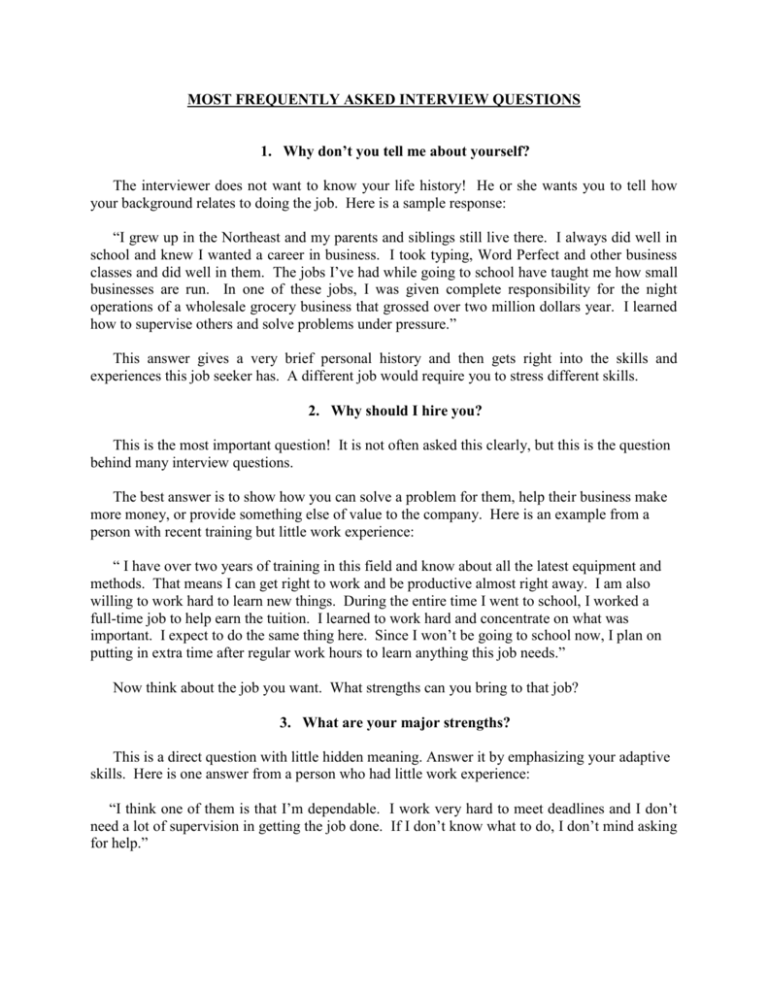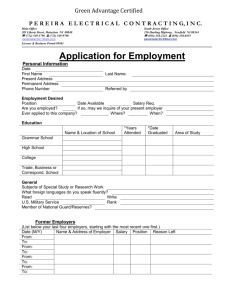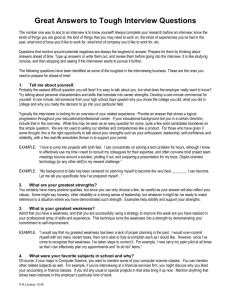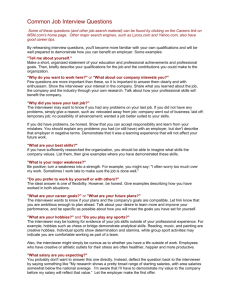most requently asked interview questions
advertisement

MOST FREQUENTLY ASKED INTERVIEW QUESTIONS 1. Why don’t you tell me about yourself? The interviewer does not want to know your life history! He or she wants you to tell how your background relates to doing the job. Here is a sample response: “I grew up in the Northeast and my parents and siblings still live there. I always did well in school and knew I wanted a career in business. I took typing, Word Perfect and other business classes and did well in them. The jobs I’ve had while going to school have taught me how small businesses are run. In one of these jobs, I was given complete responsibility for the night operations of a wholesale grocery business that grossed over two million dollars year. I learned how to supervise others and solve problems under pressure.” This answer gives a very brief personal history and then gets right into the skills and experiences this job seeker has. A different job would require you to stress different skills. 2. Why should I hire you? This is the most important question! It is not often asked this clearly, but this is the question behind many interview questions. The best answer is to show how you can solve a problem for them, help their business make more money, or provide something else of value to the company. Here is an example from a person with recent training but little work experience: “ I have over two years of training in this field and know about all the latest equipment and methods. That means I can get right to work and be productive almost right away. I am also willing to work hard to learn new things. During the entire time I went to school, I worked a full-time job to help earn the tuition. I learned to work hard and concentrate on what was important. I expect to do the same thing here. Since I won’t be going to school now, I plan on putting in extra time after regular work hours to learn anything this job needs.” Now think about the job you want. What strengths can you bring to that job? 3. What are your major strengths? This is a direct question with little hidden meaning. Answer it by emphasizing your adaptive skills. Here is one answer from a person who had little work experience: “I think one of them is that I’m dependable. I work very hard to meet deadlines and I don’t need a lot of supervision in getting the job done. If I don’t know what to do, I don’t mind asking for help.” 2 4. What are your major weaknesses? This is a question most job seekers don’t handle well. If you tell what you do poorly, you may not get the job. If you say you have no weaknesses, the interviewer won’t believe you. Ask yourself what the interviewer really wants to know. He/she wants to know if you are aware of your weaknesses and that you have learned to overcome them so that they don’t affect your work. “I do have some weaknesses. For example, in previous jobs I would get annoyed with coworkers who didn’t work as hard as I did. I sometimes said so to them and several times refused to do their work when they asked me to.” But the response should not end there. “But I have learned to deal with this better. I still work hard, but I let the supervisor deal with another worker’s problems. I’ve also gained some skills as a supervisor myself in motivating others to do more because they want to, not because I want them to.” Did you notice that this weakness isn’t such a weakness at all? Many of our strengths began in failure. We learned from them and got better. 5. What sort of pay do you expect to receive? Knowing how to answer this question could be worth a lot of money to you! Never discuss salary until you are being offered the job. Whatever you say, you will probably lose. Suppose the employer was willing to pay $25,000 per year. If you say you will take $20,000, guess what you will be paid. That may have been the most expensive ten seconds in your life! There are other ways you can lose, too. The employer may decide not to hire you at all. He/she may think they really need a person who is worth $25,000, which leaves you out. You may have asked for $26,500 and hoped you would get it. You could lose here, too. Many employers would assume you’d be unhappy with the salary they had in mind. Know the probable salary range. Before the interview, you need to know what similar jobs in similar types or organizations pay. This will give you an idea of what the position is likely to pay. The library or career center is a good source of salary information. The state Employment Service’s statistical office will give salary ranges. Bracket your salary range. 3 If you think the employer pays between $20,000 and $24,000/year, state your own range as “upper teens to low twenties” That covers the amount the employer probably had in mind and gives you room to get more. If They Pay: You Say: $5.00/hour $13,000/year $16,500/year $18,500/year $27,500/year 5 to 7 dollars per hour low to mid teens mid to upper teens upper teens to low twenties upper twenties to low thirties Never say no to a job offer before it is made or until 24 hours have passed. Remember, the objective of an interview is to get a job offer. Many job seekers get screened out early in the interview by discussing salary. The best approach is to avoid discussing salary until you are offered the job. If the money is not what you had in mind, say you want to consider the offer and will call back the next day. You can always turn it down then. You may also say that if the salary were higher you would take the position. Perhaps you could be given more responsibility to justify a higher wage? Or you could negotiate an increase after a certain period of time. Do not negotiate like this unless you are willing to give up the offer. But you just might be able to get a counter offer that you would accept. 6. How does your previous experience relate to the jobs we have here? This one requires a direct response. This question is saying, “Can you prove you have the experience and skills to do the job?” In some cases, other people with better credentials than yours will want the job you’re after. You should mention this, and then explain why you are a better choice. Here is an example of how one person handled this situation: “As you know, I have over five years of experience in a variety of jobs. While this job is in a different industry, it requires my same skills in managing people and meeting the public. In fact my daily contact with large numbers of people on previous jobs has taught me how to handle things under pressure. I feel very capable to deal with pressure and to get the job done. Be sure to mention any specific skills or training you have that will help you do the job. Include your greatest job-related strengths in your own answer to this question. 4 7. What are your plans for the future? This question is really asking whether you are likely to remain on the job. This question also asks: Will you be happy with the salary? (If not, you may leave.) Will you leave to raise a family or relocate because of your spouses’ job transfer? Do you have a history of leaving jobs after a short stay? (If so, it seems likely you will do this again.) Are you overqualified (and likely to be unhappy in this job)? Try to put yourself in an employer’s place. Then answer the real question. 8. What will your former employers (or references) say about you? The interviewer really wants to know about your adaptive skills and whether you can be depended on. Are you easy to get along with? Are you reliable? Most employers will check your references. So, if you are less than honest about problems in previous jobs, you could get caught! If everyone you ever worked for thinks you are great, answering this question will be easy. But almost everyone has had some type of a problem. If the interviewer is likely to find out about your problem by checking with previous employers, honesty could be the best policy. Tell it like it was and accept responsibility for being part of the problem. Many interviewers have had problems on their jobs. It’s no sin and often has little to do with being a good worker. If you learned something from the experience, say so. In a way, this question is similar to asking you for your major weakness. The right answer to this question can get you the job – even if you have to reveal some negative information. Here is an example: “If you check with my two previous employers, they will both tell you that I’m a good worker and that I do things right. But you may find out that one of them is not too enthusiastic about me. I really can’t explain why we did not get along. I tried to do my best, but he passed me over for merit raises twice.” “She will tell you that I got the work done, but she may also tell you that I was not willing to socialize with the other workers after hours. I had a new baby and I was working full time. I was very reliable, but it was true that I didn’t go out with the others. I left on my own and got my next job with a boss who will say wonderful things about me.” If you do expect a problem from a previous employer, try to find out exactly what he or she will say. If possible, talk it over so you know exactly what they will say when giving a reference. Ask them to write you a letter of reference. Usually, they will not be too negative in a letter and your new employer may accept the letter and not call. 5 If you still know that this employer will give you a negative reference, think of someone else you worked with closely in the same organization. Ask that person to give you a reference instead. 9. Why are you looking for this sort of position and why here? Employers know that you will do better in the job you really want. Employers want to make sure you know what you want. They also want you to tell them what you like about the job. And what you like about doing this job in their organization. The closer you come to wanting what they have, the better. The best answer for this is the absolute truth. You need a clear idea of the type of job you want. You also need to know the type of organization and people you want to work with. 10. Why don’t you tell me about your personal situation? Very few interviewers will ask this question so directly. But they do want to know. They will try to find out in casual conversation. While you may tell this is none of their business, they probably won’t hire you unless they feel comfortable about your response. The issue is whether you can be counted on. They will look for signs that you are unstable or unreliable. You could argue that interviewers would be unfair and biased if they asked some of these questions. But you must understand that they really only need to be told that you can be counted on. Even if you just moved here, even if you have kids, even if you are single. When responding to a question about your personal life, be friendly and positive. The message to give is that your personal situation will not hurt your ability to do a good job. Here are some sample responses: Young children at home: “I have two children, both in school. Childcare is no problem since they attend an after school center. The center also takes care of children with minor illnesses.” Single head of household: “I’m not married and have two children at home. It is very, very important to me to have a steady income, and so child care is no problem.” Young and single: “I’m not married, and if I should marry, that would not change my plans for a full-time career. For now, I can devote my full attention to my career.” Just moved here: “I’ve decided to settle here in Gulf Valley permanently. I’ve rented an apartment and the six moving vans are unloading there now.” Leisure: “My time is family-centered when I’m not working. I’m also active in a few community organizations and spend at least some time each week in church activities.” All these responses could be expanded, but they should give you an idea of approaches you can take.








